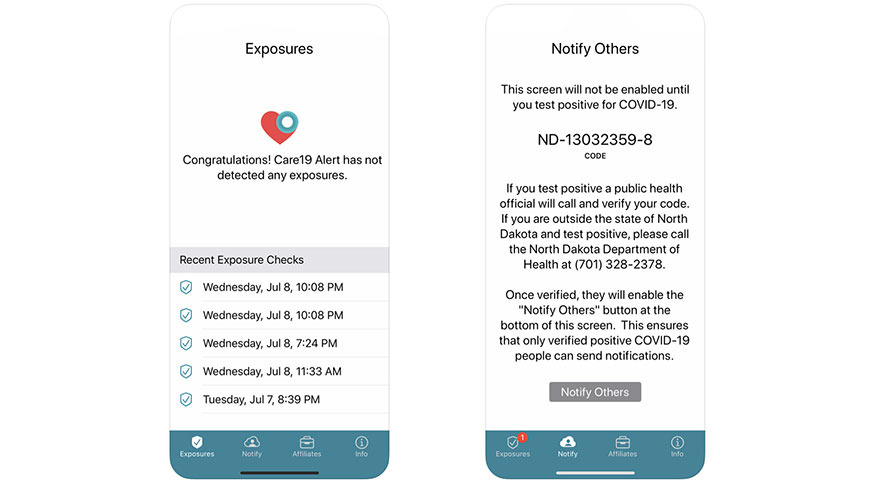Three U.S. states — North Dakota, Wyoming and Alabama — this week rolled out or announced the imminent rollout of coronavirus contact tracing apps built using Apple and Google's Exposure Notification API.
North Dakota became the second state to adopt the Apple-Google API when its Care19 Alert app went live on Thursday. The app, developed by ProudCrowd, is the first to enable communication with contact tracing apps maintained by other states. In July, the Association of Public Health Laboratories announced a partnership with Apple, Google and Microsoft to build a national server for the secure storage and dissemination of COVID-19 Exposure Notification data, a project that promises tracking continuity across state borders. Whether North Dakota's app integrates with APHL's server is unclear.
A second ProudCrowd app will debut in Wyoming on Friday, reports Reuters. Alabama is also set to release a similar app on Monday following testing by University of Alabama at Birmingham students and staff, the report said.
In the coming weeks, Washington and Pennsylvania could also issue contact tracing apps that integrate the Exposure Notification API. Others, like South Carolina, have signaled intent to roll out similar app solutions, but official release dates have not been announced.
Virginia last week was the first state to launch a COVID-19 tracking app using the Apple-Google technology.
Previous attempts to launch apps based on proprietary contact tracing systems in the U.S. have in large part failed to gain traction. In some cases, like Utah's Healthy Together app, the tepid response was blamed on privacy invasive features such as location tracking and the gathering of personal information.
The Apple-Google Exposure Notification API uses random device identifiers — keys — to generate temporary IDs that are sent between devices via close proximity Bluetooth communications. By swapping keys, apps integrating the Apple-Google system can track and notify users when they are exposed to others who test positive for coronavirus.
With security at the fore, the solution does not store data on central servers run by Apple or Google, but instead silos anonymized Bluetooth beacons on user devices until participants elect to share the information with an outside party. If and when a user is diagnosed with COVID-19, they can opt to upload a 14-day list of recent anonymized contacts to a distribution server, which matches beacon IDs and sends out notifications alerting those individuals that they came in close contact with a carrier of the virus. Doctors can also peruse the data, if such access is granted.
The efficacy of digital contact tracing solutions is unknown, but at least one study suggests the daily number of infections can be reduced if a mere 20% to 40% of a given population downloads and uses such apps. While uptake has been slow in the U.S., international adoption has been relatively strong. For example, Ireland and Germany are seeing robust downloads of apps based on the Exposure Notification API.
 Mikey Campbell
Mikey Campbell







-m.jpg)






 Christine McKee
Christine McKee
 Malcolm Owen
Malcolm Owen
 Marko Zivkovic
Marko Zivkovic

 Andrew Orr
Andrew Orr
 Andrew O'Hara
Andrew O'Hara
 William Gallagher
William Gallagher





-m.jpg)



11 Comments
I can't speak to the Wyoming and ND situations, but I know Alabama has been hit hard by outbreaks recently (coughINEPTLEADERSHIPcough) and it is about to get much worse with the re-opening of in-person schools. While a lot more of a sea change in mentality is needed by the state/city governments and more importantly the general public there to effectively combat this pandemic (according to friends and family in the state, which includes some teachers), I certainly hope Alabama's adoption of the exposure notification app, if coupled with a strong PR drive to encourage people to educate themselves about it and download it, will save lives and needless suffering.
Waiting for new York State to get on board with this app also.
Would this be a way of handling it George, encourage stronger local enforcement since the Federal Government can't be everywhere and pesky State's Rights prevent some actions anyway. You've generally said we should have handled it like China whose actions you seem quite proud of.
https://www.ft.com/content/fd2d8bf8-587a-11ea-abe5-8e03987b7b20
https://www.cbc.ca/player/play/1703503427818/
There will be plenty of time to assign blame after the situation is dealt with. Would any other state or nation have failed to recognize the severity and ease with which the virus could spread? Quite likely because nobody is infallible, cautious optimism can go horribly wrong, and there are some things that defy control. But really, all of this presumptive blaming is a child’s game and serves no constructive purpose towards the containment and mitigation of the existing threat in the moment.